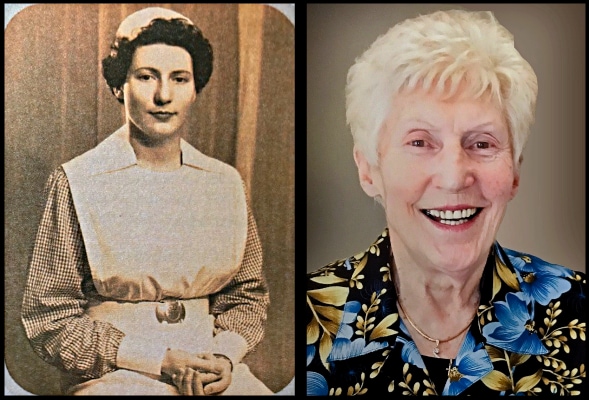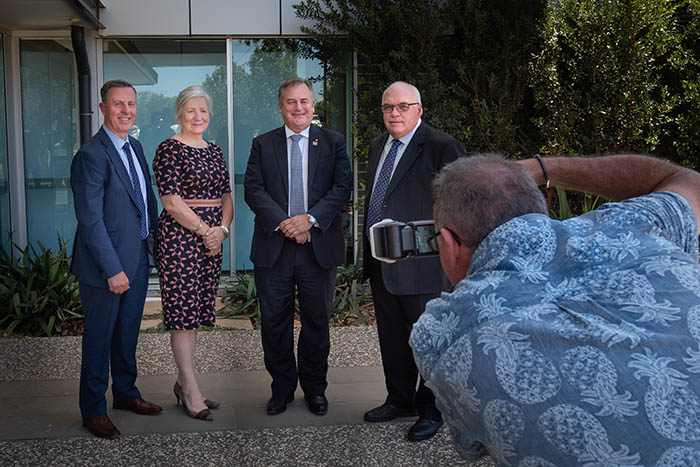The largest bequest dedicated to the University of New England in decades will be invested towards the University's mission of improving regional and remote healthcare.
The $15 million endowment left by former Tamworth resident Betty Fyffe (see profile below), who died in January after a long career dedicated to the nursing profession, is being shared by the universities of New England and Newcastle in support of healthcare-related education in their communities.
UNE will portion part of its share of the proceeds of the Elizabeth Cahill Fyffe Trust towards annually supporting 50 regional UNE students in the medical disciplines with individual $4000 scholarships to aid their studies.
The rest of the UNE bequest will be invested in the University's new Rural Healthcare Solutions Program, which will create training pathways that encourage UNE medical graduates to remain and work in regional areas.
University of New England Vice-Chancellor and CEO, Professor Brigid Heywood, said the bequest would help Australia’s first regional university continue its mission to improve healthcare in rural and remote communities.
“The quality of your healthcare shouldn’t depend upon having a postcode in a capital city,” said Professor Heywood. “The urgent need to create quality healthcare outcomes for our regional communities is an issue of national significance that UNE sees as an important priority.”
“Betty’s generous bequest will help UNE in our mission to train healthcare professionals in a regional context, so that they understand the healthcare environment here, and most importantly, so that they are more likely to live and work in our regional communities when they enter the workforce.”
A core initiative of the program will be backing students to spend one of their final two clinical years in a rural township. The students will live, work, and develop relationships within the community, and learn how the medical world looks from the patient's perspective.
"UNE’s Rural Healthcare Solutions program aims to give students a hands-on healthcare apprenticeship in a rural community," said Professor Rod McClure, Dean of UNE's Faculty of Medicine and Health.
"Spending a year in a rural centre, caring for community members, enables students to develop strong relationships and to become a valued member of the clinical health team."
"The program will be built on practical working partnerships between UNE and rural communities around our region, who will in effect ‘own’ the students placed with them."
"The evidence from other similar initiatives is that students who take this pathway will graduate feeling better prepared and more confident in their clinical skills, and work-ready compared to graduates of a traditional metropolitan hospital block rotation."
Students who take this path will not suffer any educational disadvantage, Prof. McClure said, because their professional training will be maintained through online communications technologies.
"It may even be an enhanced form of training, because a student will have virtual access to all the facilities of a modern hospital and still be able to apply their learning directly to the hands-on situations they encounter within their communities."
The program is part of a broader strategy to address what Prof McClure termed "a crisis in rural healthcare".
Females in remote areas currently live on average nearly 14 fewer years than a counterpart born in a metropolitan area. For males, the deficit is 11 years.
The difference in mortality rates is similarly stark. Deaths of males per 100,000 people per year is 39% per cent higher in remote areas compared to metropolitan areas; for females, the difference is 33%.
Many factors influence these statistics, including higher rates of alcohol and tobacco use, riskier occupations, higher rates of unemployment, and geographic isolation – which, among other things, can limit access to fresh food.
UNE is using the Fyffe bequest to address another factor: the more limited access to healthcare in regional and remote areas, which is aggravated by a lack of healthcare practitioners.
"We can't remedy this crisis simply by increasing the number of medical and nursing students from country areas," Prof. McClure said.
"The problem is complex, and to fix it we need to start by giving medical and nursing students reasons to stay and practice in the regions. The Rural Healthcare Solutions program is one approach to address this challenge."
Click for more information about UNE's Fyffe scholarships
Rural healthcare in crisis
Within 10 years, on current trends compared to metropolitan areas, Australians living in regional and remote areas will have access to:
* a fifth of the number of general practitioners - 43 in regional compared to 255 in metro areas, per 100,000 people.
* a third of the psychologists - 34 compared to 104 / 100,000.
* a twelfth of the physiotherapists - 23 compared to 276 /100,000.
* half the pharmacists - 52 compared to 113 / 100,000.
Betty Fyffe: A legacy of caring
Despite spending many years working in Sydney as a nurse, Dorrigo-born Betty Fyffe retained a deep affection for country people. Her dedication to their welfare is at the heart of the Elizabeth Cahill Fyffe Trust, established to help address medical staff shortages and healthcare inequalities in rural and regional Australia.
Up until her death, in early January 2019 aged 92, Betty considered herself the honorary nurse at her Tamworth nursing home, Nazareth House. "She would walk into the rooms of fellow residents, ask them how they were and proceed to take their pulse; she was always giving medical assistance," said Steve Mathews, from accountancy firm Malvern Mathews Smith, who is a trustee of her trust along with Michael Smith. "Nursing was her passion in life and that strong desire to help others was ingrained in her, right until the end."
An only child, Elizabeth “Betty” Fyffe (nee Cahill) grew up around her family's string of chemist shops (the Cahills had five stretching from Quirindi to Tenterfield, including pharmacies in Tamworth and Armidale). After finishing boarding school in Sydney she opted for a nursing career, against her father's wishes, and trained at St Vincent's Hospital, before moving to Crown Street Hospital to undertake her obstetrics training. Betty also nursed at the Crown Street Women's Hospital, Royal South Sydney Hospital and Prince of Wales Hospital.
An avid traveller and prolific walker, who three times met Queen Elizabeth II and twice won the lottery, Betty also -upon retirement - volunteered at Prince of Wales Hospital, St Vincents Hospital (or Vincents as she religiously referred to it), the NSW Art Gallery, Sacred Heart Hospice and the Garvan Institute of Medical Research. Her philanthropy included annual donations to the institute's nursing outreach program in Dubbo as well as the Westpac Rescue Helicopter Service.
Long-time friend and fellow nurse Leslie Wright remembers Betty as "loyal, funny, quick-witted and eccentric", who was just as much at home nursing Kings Cross "ladies of the night" as she was some of Sydney's wealthiest businessmen.
"Betty was always full of questions and took a genuine interest in others, whether it was the doorman of the Hilton Hotel or its general manager," Steve recalls. "She got on with everyone, made friends quickly, and had a wide circle of friends from all walks of life."

Image: Betty Fyffe, nurse and philanthropist.


